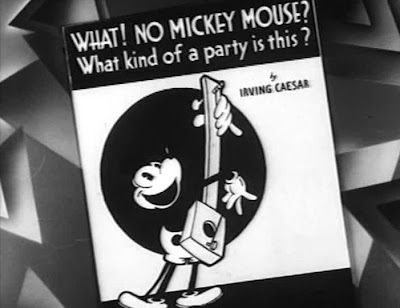Follow-Up To Yesterday ...
A Saturday In The Life Of The Mickey Mouse Club
I want someone (other than myself) to write a book about the Mickey Mouse Clubs. Not the 50's TV program, and besides, that's been done. I speak of the theatre clubs, which to hear trades tell it, was a biggest-ever 30's matinee phenomenon and together with product tie-ins bought by Mickey fans, kept Disney in business through struggle that was the Great Depression. His cartoons alone were not a profit center, what with money spent to make them a best on the market. What floated WD's boat was MM watches, coloring books, novelties of all sorts. These were most responsible for holding Big Bad Wolves at bay. As Walt often said, It Started With a Mouse. The Clubs were what organized his army, being millions strong by reliable estimate. Was this unprecedented? Had there been Felix The Cat clubs? He was cartooning's biggest name before Mickey entered, but by talkies' arrival, was twilighting. Showmen who tied on with Mouse clubs rode to capacity weekends, and the only thing to rival them would be arrival of Popeye Clubs later in the decade.
 |
| You Could As Easily Make a Horror Movie Using These Creepy Faces |
There was a theme song, Minnie's Yoo-Hoo, led onscreen by a rat-like Mickey in a voice that doesn't sound like Walt's. The "sing-along" reel would be provided to member theatres, object being for youngsters to learn lyrics and reprise them each week. Minnie's Yoo-Hoo must not have been copyrighted, or perhaps not renewed, because I remember it popping up in 8 and 16mm catalogues during the seventies (did Thunderbird sell prints?). There was also a pop tune called What! No Mickey Mouse? What Kind Of Party Is This?, by Irving Caesar that became catch phrase for wise-alecks entering 30's Bijous, as happens in a scene from live action Lady Killer, a 1933 Warners release. Success of the Mickey Clubs was widespread and well-known. Camaraderie among Mouseketeers must have been intense, but wait, I'm not sure they called themselves Mouseketeers in those early days. Imagine bonds being formed that lasted lifetimes, reunions afterward beginning with, Yeah, we were in Mouse Club together back in Peoria, this not unlike boy or girl scout members who'd later meet and reminisce of that shared experience.
Notable Saturdays in the Mickey Club life include ones during April, 1931 among close-quartered





3 Comments:
Here's "Minnie's Yoo Hoo":
http://www.youtube.com/watch?v=gXfSeJV_vS4
...which I remember running for a college audience maybe 35 years ago, and the film's audience-participation gimmick still worked. I can still hear the shrill "YOOOOO... HOOOOOOOO!" echoing throughout the auditorium.
I first knew the song as the closing theme of Walt Disney's attempt to imitate "Laugh-In," the syndicated "Mouse Factory." The song was performed (and played back at a faster speed) by Bill Skiles and Pete Henderson.
Yes, John, Thunderbird did sell 16mm & S8S prints of MINNIE YOO HOO.
The source material was a beautiful 35mm nitrate supplied, I think, by Jeff Joseph, bless his heart.
This is an excerpt from a webpage feature about the Alabama Theater, the showplace of Birmingham (and still around today)
(T)he playhouse became the weekly Saturday meeting spot for local boys and girls who were members of the Mickey Mouse Club. This was a promotion dreamed up by that impossible dreamer Walt Disney himself and instituted in movie theaters across the nation. From Orlando to Anaheim, kids gathered at their local showplaces to watch Disney cartoons (naturally), play games, and see amateur talent shows, all the while squeaking the Club slogan:
Handy! Dandy! Sweet as candy!
Happy kids are we!
Eenie! Ickie! Minnie! Mickey!
M-O-U-S-E!
Things were no different in Birmingham, although the Alabama did claim at one time the distinction of having the largest Mickey Mouse Club in the world, numbering some 10,000 junior Mickeys. The ringleader of the rat pack during the 1930s was the theater's assistant manager, George Neleans, who was known to the kids as "Grandpa Mickey Mouse." The Birmingham News reported on how "Grandpa" managed to keep any sort of discipline among the 2,000+ youngsters who crowded into the theater every Saturday:
"Occasionally some older members begin booing and hissing a performance. Grandpa Mickey Mouse halts all proceedings. 'Now fellows,' he says, 'there are some people in here who don't like what we are doing. I want everybody here who disapproves of what these people are doing to hold up his hand.' Every hand goes up, and you can bet that all disturbances are over for the day."
For a while, the weekly shenanigans were broadcast over WBRC Radio. Local stores such as Pizitz, Sears, and Loveman's provided prizes to be given away, for which they received the thanks of being known as "Big Brother Mickey Mice." In March 1934, however, the weekly Mickey Mouse Club meeting was interrupted by a gift from Loveman's that the department store would have preferred not to give. During the afternoon performance, a fire quickly engulfed the entire 1899 building.
Parents who had left their children in the care of Mickey and his cartoon and human friends were understandably hysterical, but fortunately a 36-inch firewall separated the department store from the Alabama, so while Loveman's burned to the ground the theater remained intact with only a bit of smoke damage. When the new Loveman's building was constructed on the spot where the old one had stood, a passageway was made from the top floor of the Alabama into the employees' lounge of the store, and the two establishments would share their joys and sorrows forever after.
(Tim Hollis)
Paul Duca
Post a Comment
<< Home